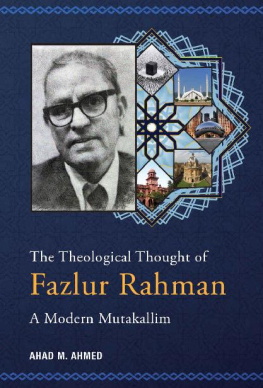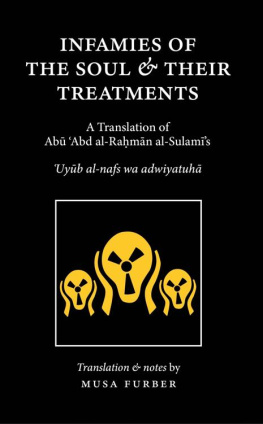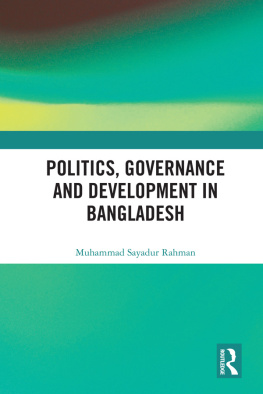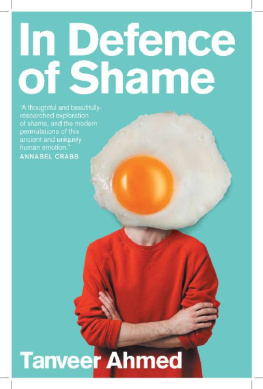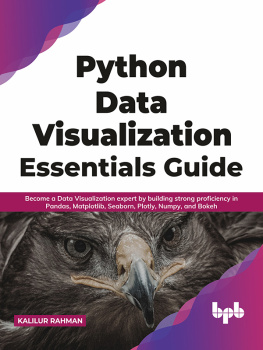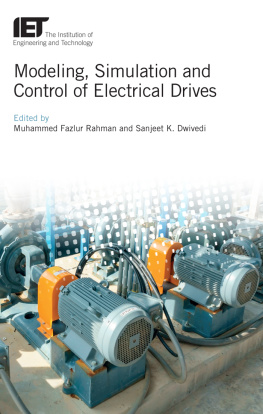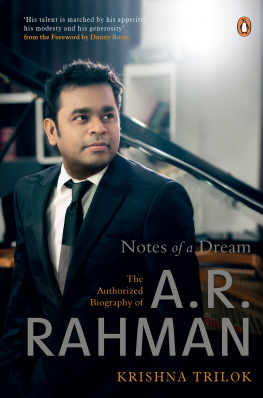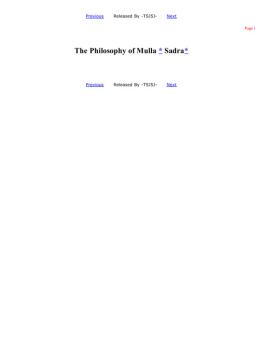Ahad M Ahmed - The Theological Thought of Fazlur Rahman: A Modern Mutakallim
Here you can read online Ahad M Ahmed - The Theological Thought of Fazlur Rahman: A Modern Mutakallim full text of the book (entire story) in english for free. Download pdf and epub, get meaning, cover and reviews about this ebook. year: 2017, publisher: Islamic Book Trust, genre: Science. Description of the work, (preface) as well as reviews are available. Best literature library LitArk.com created for fans of good reading and offers a wide selection of genres:
Romance novel
Science fiction
Adventure
Detective
Science
History
Home and family
Prose
Art
Politics
Computer
Non-fiction
Religion
Business
Children
Humor
Choose a favorite category and find really read worthwhile books. Enjoy immersion in the world of imagination, feel the emotions of the characters or learn something new for yourself, make an fascinating discovery.
- Book:The Theological Thought of Fazlur Rahman: A Modern Mutakallim
- Author:
- Publisher:Islamic Book Trust
- Genre:
- Year:2017
- Rating:5 / 5
- Favourites:Add to favourites
- Your mark:
- 100
- 1
- 2
- 3
- 4
- 5
The Theological Thought of Fazlur Rahman: A Modern Mutakallim: summary, description and annotation
We offer to read an annotation, description, summary or preface (depends on what the author of the book "The Theological Thought of Fazlur Rahman: A Modern Mutakallim" wrote himself). If you haven't found the necessary information about the book — write in the comments, we will try to find it.
Ahad M Ahmed: author's other books
Who wrote The Theological Thought of Fazlur Rahman: A Modern Mutakallim? Find out the surname, the name of the author of the book and a list of all author's works by series.
The Theological Thought of Fazlur Rahman: A Modern Mutakallim — read online for free the complete book (whole text) full work
Below is the text of the book, divided by pages. System saving the place of the last page read, allows you to conveniently read the book "The Theological Thought of Fazlur Rahman: A Modern Mutakallim" online for free, without having to search again every time where you left off. Put a bookmark, and you can go to the page where you finished reading at any time.
Font size:
Interval:
Bookmark:
The Theological Thought of Fazlur Rahman:
A Modern Mutakallim
The Theological Thought of
Fazlur
Rahman
A Modern Mutakallim
AHAD M. AHMED
Ahad M. Ahmed 2017
All rights reserved. No part of this publication may be reproduced, stored in a retrieval system, or transmitted, in any form or by any means, electronic, mechanical, photocopying, recording or otherwise without the prior permission of the publisher.
Published by
Islamic Book Trust
607 Mutiara Majestic
Jalan Othman
46000 Petaling Jaya
Selangor, Malaysia
www.ibtbooks.com
Islamic Book Trust is affiliated with The Other Press.
Perpustakaan Negara Malaysia Cataloguing-in-Publication Data
Ahmed, Ahad M.
The theological thought of Fazlur Rahman : A Modern Mutakallim /
Ahad M. Ahmed.
Includes index
Bibliography : p.263
ISBN 978-967-0526-34-8
1. Theologians, Muslim. 2. Philosophers, Muslim.
3. Knowledge, Theory of (Islam). 1. Title.
922.97
Printed by
SS Graphic Printers (M) Sdn Bhd
Lot 7 & 8, Jalan TIB 3, Taman Industri Bolton,
68100 Batu Caves, Selangor Darul Ehsan.
Introduction
Problem Statement
Methodology
Literature Review
Chapters
Chapter I: Fazlur Rahmans Life: A Biographical Overview
Fazlur Rahman: Youth, Curiosity and the Making
of an Intellectual; In the Footsteps of an Icon,
Iqbal (1919-1946)
Fazlur Rahman and Gibb: Post World War II, Reformed Orientalism, Independent Pakistan and the Making of a
Scholar (1946-1958)
Smith & Fazlur Rahman: Visionaries, Islamism Within and
Outside the Faith (1958-1961)
Ayub Khan, Fazlur Rahman Director of Central Institute for Islamic Research (1962-1968): Philosophico-Religious Reformer
Fazlur Rahman and America: Scholar, Activist ( D ), Religious Savant & Legacy Shaping an Islamic Discourse (1968-1988)
Fazlur Rahmans Writings
Avicennas Psychology
Avicennas De Anima
Prophecy in Islam: Philosophy and Orthodoxy
Selected Letters of Amad Sirhind
Islamic Methodology in History
Islam
The Philosophy of Mulla Sadra
Major Themes of the Quran
Islam and Modernity
Health and Medicine in the Islamic Tradition
Revival and Reform in Islam: A Study of Islamic
Fundamentalism
The Influence of Orientalism on Fazlur Rahman and
Its Significance in the Acceptance of his Works
Sources of Fazlur Rahmans Islamic Thought
Ijm and Ijtihd : The Influence of Kalm
Sunnah and Hadith
Chapter II: Emergence and Development of Islamic Theology
Stages and Evolution
Classical Period of Kalm
Companions of the Prophet ( )
General Survey of the Early Schisms
Shia and Khawrij
Murjia
Irj and Qadarism Political Pacifism and
Predeterminism
Theological Legal Doctrine of Good and Bad
( Al Husn wal Qubh )
Asharsm, Maturidism and Sunnism
Post-Formative Stage in Kalm
Philosophical Movement and its Relationship with the
Kalm Movement
Al Ghazls Reformist Synthesis
Later Medieval Reform Ibn Taymya and Ahmad Sirhind
Ahmad Sirhind Renovator of the Second Millenium
Classical Modernism
Chapter III: Concept of God
Functional Nature of the Concept of God
God as the Necessary Being
Orderliness of the Universe & Unity in God:
Gods Immanent-cum-Transcendent Nature
Fazlur Rahmans Principle of Naturalistic Interpretation
( tawl )
Pragmatic Arguments for Belief in God
Moral Arguments for Belief in God
Gods Relationship to the Universe
God-Universe Relationship with Man
Doctrine of Mans Creative Knowledge
Doctrine of Divine Trust ( Amanah )
Doctrine of Mans Actions and Divine Response
Chapter IV: Concept of Prophethood
Doctrine of Miracles ( mujiza )
Doctrine of the Moral lan of the Quran
Doctrine of Prophecy (Prophetic Intellection) and
Divine Revelation
Doctrine of Prophetic Infallibility ( isma )
Doctrine of Intercession ( Shifaat al-Nabi )
Khawrij on the Doctrine of Intercession
Mutzilites on the Doctrine of Intercession
Ashartes on the Doctrine of Intercession
Maturidites on the Doctrine of Intercession
Intercession in the Qur'an
Bibliography
To my mother and father
for their untiring support and love
I would sincerely like to thank those that have helped me in completing this dissertation which has taken well over three years to complete. I would first like to thank my wife Ruba for her unmitigating support, faith and love for Allah, His Messenger and His cause. In the face of all opposition and difficult circumstances her support for me has been unwavering and tremendously valuable. Secondly, I would like to thank both my guides and mentors Dr. Nabil al-Fouly and Dr. Faruk Terzic for their loving, insightful and congenial attitude throughout my academic sojourn here at International Islamic University.
My teachers Dr. Zafar Ishaq Ansari, Dr. Muhammad al-Ghazali, Dr. Khalid Masud and Dr. Ahmad Jad guided me throughout my research with their valuable criticisms and suggestions. My friends Dr. Adeel Khan and Dr. Faruk Terzic for reading the manuscript and providing helpful suggestions and guidance.
Lastly, the publicaiton of this work could not be possible without the sincere and erstwhile interest of Mr. Haji PK Koya. In May 2016, Mr. Koya contacted me to publish my work on the late (Shaykh) Dr. Fazlur Rahman with the interest to provide a pathway on how to approach him and develop a more empathetic and deeper understanding regarding his life and work. His encouragement and belief in the value of Fazlur Rahman's work as one of the greatest thinkers of Islam whilst being gravely misunderstood by scholar and naivete alike, gave me the reassurance that work deserved to be published by such a sincere and honest publishing house. Mr. Koya's patience, sincerity and dedication deserve my heartfelt gratitude and respect.
Since the nineteenth century, the traditional understanding of Islam has been scrutinized mainly due to the impact of Western imperialism and colonialism upon the Muslim world. Western occupation upon the Islamic world resulted in Muslims asserting their religious, socio-economic and political identities. Additionally, Orientalism and Christian missionary writings brought about an intellectual response from the Muslim intellectual elite. The effect of Western presence brought into question the viability of the traditional understanding of Islam upheld by the Ulama. Muslim intellectuals who contended that traditional Islam was responsible for the backwardness ( takhaluf ) and political subjugation ( istibdad ) of Muslims, recommended modernism ( tajdid ), reformism ( islah ) and revivalism ( nahda ) as being necessary for the emancipation of Muslims and their progress. However, different Muslim responses were voiced towards the West and according to Masud some can be categorized under the rubric of Islamic modernism.
In the Indian subcontinent, Sir Sayyid Ahmad Khan is regarded as the father of Indian Islamic modernism. In both the political and intellectual realms he contributed towards emancipating Indian Muslims from their decadent state. Khan contended that it was imperative that a new theology or jadid ilm ul-kalm
According to Masud, Iqbls public lectures given in the 1920s, which were later published under the title The Reconstruction of Religious Thought in Islam addressed the issues posed by Western modernity. In his view, this view offered a new Islamic theology of modernity in continuation of Sayyid Ahmad Khans call for jadid ilm ul-kalm . Some urdu translations of Iqbals work in South Asia are titled as jadid ilm ul-kalm or jadid Illahiyat. Iqbl observed that traditional kalm was nothing more than concepts of theological systems, draped in the terminology of a practically dead metaphysics In the intellectual and political realms, modern scientism, atheism and secularism were significant factors that impacted Muslim society. Muslim intellectual, social and political activists contended that Islam must be able to civilizationally and culturally respond to Western modernity.
Font size:
Interval:
Bookmark:
Similar books «The Theological Thought of Fazlur Rahman: A Modern Mutakallim»
Look at similar books to The Theological Thought of Fazlur Rahman: A Modern Mutakallim. We have selected literature similar in name and meaning in the hope of providing readers with more options to find new, interesting, not yet read works.
Discussion, reviews of the book The Theological Thought of Fazlur Rahman: A Modern Mutakallim and just readers' own opinions. Leave your comments, write what you think about the work, its meaning or the main characters. Specify what exactly you liked and what you didn't like, and why you think so.

